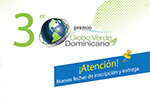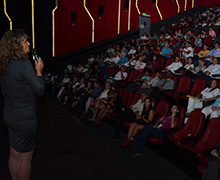Otter 501
Friday, September 6th at 10:00 AM Santo Domingo, FUNGLODE
Topic of panel:
Why Save Endangered Species?
Say “cheese” mother earth! - Nature Photography
Friday, September 6th at 4:00 pm Santo Domingo, FUNGLODE
Go Wild with GoPro!
Saturday, September 7th at 4:00 pm Santo Domingo, FUNGLODE
Globo Verde Dominicano Award
Saturday, September 7 at 8 PM Santo Domingo, FUNGLODE
Topic of panel:
Environmental film: An Effective Tool for Eco Education
GFDD and FUNGLODE Celebrate Opening Night Ceremony of III DR Environmental with Film Festival with Eye-opening Documentary about Population Growth
Santo Domingo, September 5, 2013
TweetThe Global Foundation for Democracy and Development (GFDD) and its sister institution in the Dominican Republic, Fundación Global Democracia y Desarrollo (FUNGLODE), held their gala ceremony to inaugurate the III Dominican Republic Environmental Film Festival (DREFF) on Wednesday evening at the Palacio del Cine-Agora Mall in Santo Domingo.
Speaking to a packed hall, DREFF Director, Natasha Despotovic, introduced this year’s extraordinary film schedule and activities program. She explained that the Festival’s five themes are: ocean conservation, biodiversity, climate change, green economy and sustainable agriculture.
Ms. Despotovic thanked everyone for coming and supporting this event and that she hoped to see everyone regularly in the coming years. She gave a special thanks to the Director of the Agora Mall Mr. Jose Miguel. “Working together has been a fruitful and meaningful allegiance and we hope to continue well into the future,” said Despotovic.
GFDD’s Executive Director then proudly announced a surprise short film premiere screening of a GFDD in-house production, to the delight of the audience. The 15 minute gem of a documentary, Garbage or Resource: A Dominican Republic Experience, takes alook at garbage like it is rarely ever looked at – a diamond in the rough and the perfect raw material to make all manner of beautiful and useful objects. “Change is happening,” said Ginny Heinsen, Director of 3R (Reuse, Reduce and Recycle) project from CEDAF (Centro para el Desarrollo Agropecuario y Forestal), “Dominicans are waking up and taking action.”
Ms. Despotovic then introduced the much-awaited opening night film, Mother: Caring for 7 Billion, an award-winning documentary about over-population that draws the not-so-obvious connection between caring for the mothers of the world while caring for Mother Earth. Many critics have said, and Ms. Despotovic concurred, this film breaks a 40-year taboo by talking about the issue that silently fuels humanity’s most pressing environmental, humanitarian and social crises: population growth. As of 2011, viewers learned at last night’s screening, the world’s population has reached seven billion, a seven-fold increase since the first billion was reached 200 years ago.
Spellbound by the 68-minute documentary, the predominantly Dominican audience absorbed many well known but even more lesser-known and shocking facts about over-population and its effect on the environment. The beautifully crafted and informative film, according to many audience commentaries, revealed that nearly 1 billion people still suffer from chronic hunger as the so-called Green Revolution of the 1970s is coming to an end due to the diminishing availability of the earth’s oil and water. The film asserts that controlling population growth is a key environmentalist issue that has been almost forgotten since the 1970s at great peril to humanity, especially as the rest of the developing world looks to the consumer patterns of the middle-class in the U.S. as a model. If the rest of the world bought and used as much consumer goods per-capita as the U.S., it would take six Earths to replenish and store all the natural resources needed and waste created. And, as the film asserts, with 78 million more people living on the Earth each year and 50 million new people annually joining the middle-class, worldwide consumption patterns create a “ticking bomb” scenario.
Preceding the feature film, Ms. Despotovic called to the stage the film’s producers Christophe Fauchere and Joyce Johnson to ask what inspired them to make the film and what we can do to preserve our planet’s natural resources for the wellbeing of future generations.
The husband and wife team, talked a bit about making the film. “It was a very interesting subject for us.....population and the caring capacity.”
Having traveled to Ethiopia to shoot part of the film, they wondered initially how they would be accepted there especially making a film that touched on so many delicate and personal issues. “As a filmmaker it was interesting to make a film on an issue that was taboo,” said Chris.
Closer to home, United Nations Population Fund (UNFPA) Representative in the DR, Jeremy Freehill said “In the Dominican Republic, 38% of the population are between the ages of 10 and 29 years of age. We have a big young population that can contribute to the national economy and the growth of the country.”
He pointed out that the “7th billion baby had a mother who was just 16 and the grandmother just 30, so there is a syndrome that needs to be taken care of and we need to educate our youth. This situation will be projected in the movie.”
It became clear that the film’s message is that a fair and just solution will likely only be found in a complete refocusing of our priorities and societies. Specifically, we must value diversity, human and biological, over the gross national product and human solidary over competition.
The opening night ceremony also included a brief overview of GFDD and FUNDGLODE’s accomplishments and news on the various environmental programs and initiatives that have grown out of the DR Environmental Film Festival including what the Festival itself is doing to raise awareness and deepen understanding of environmental issues among Latin Americans in general and Dominicans in particular.
About the III DR Environmental Film Festival
The III DR Environmental Film Festival, September 4 to 8, 2013, was originally founded by former Dominican President, Dr. Leonel Fernández, who is the current President of the DREFF. The Festival aims to raise awareness and deepen the understanding of environmental issues among Dominican audiences. Now in its 3rd year, the Festival seeks to promote dialogue and inspire Dominican audiences to adopt practices that will ensure the country's environmental sustainability and health. As part of this objective, the Festival seeks to provide all audiences, with a focus on youth, an opportunity to see the most beautiful, informative and educational environmental films of the year, made both in the DR and abroad. The universal themes of the films seek to educate viewers about the pressing issues while instilling an appreciation of the diversity and beauty the country has to offer and, hopefully, inspire greater environmental stewardship.
Screenings will take place in different locations across the country including the cities of Santo Domingo (28 screenings between September 4-8), Santiago de los Caballeros (4 screenings between September 5-8), Puerto Plata (7 screenings between September 5-7), Punta Cana (3 screenings between September 5-7), San Francisco de Macoris (8 screenings between September 5-8), Bani (5 screenings between September 5-7) and San Juan de la Maguana (3 screenings between September 5-8).
Visit our webpage for more information and the full program: www.dreff.org or contact us at info@dreff.org.
Follow us on Facebook and Twitter, and don’t miss any of the latest developments.
![]() Facebook: http://www.facebook.com/MuestraCineMedioambiental
Facebook: http://www.facebook.com/MuestraCineMedioambiental
![]() Twitter: http://twitter.com/muestracine
Twitter: http://twitter.com/muestracine
Comments
Trending News
- Third Edition of Globo Verde Dominicano Award Introducing a New Category in the Area of Photography
Santo Domingo, March 24, 2014 - GFDD’s RDescubre Program Inspires Environmental Stewardship through Education
Santo Domingo, March 18, 2014 - ReCrearte Program continues to gain strength across the country
Santo Domingo, March 5, 2014 - GFDD Short Film Wins Best Documentary at the 2014 Green Lens Environmental Film Festival
De Kalb, Illinois, February 27, 2014 - GFDD and Human Film Crew to Give Workshop on “The Art of the Interview: Techniques for Establishing Good Dialogue in the Production of a Documentary”
Santo Domingo, February 15, 2014 - Dominican Students Conquer New Heights on Mountain Hike to Pico Duarte
Santo Domingo, February 8, 2014 - GFDD’s Participates in the Princeton Environmental Film Festival with its own Dominican Eco-Short
New York, January 29, 2014 - GFDD's New Series of Eco-Courses Aid Sustainable Agricultural Development in the Dominican Republic
Santo Domingo, January 24, 2014









